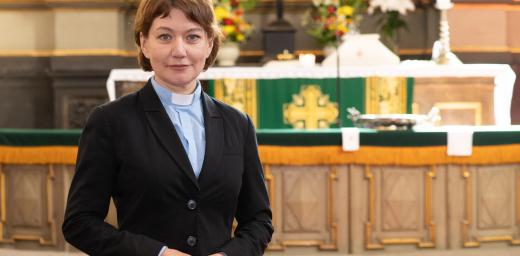AIDS: Churches work across local networks in Latin America and Caribbean

The outline of candle lit global map used to remember those affected by AIDS around the world. Photo: LWF/P.Cuyatti
GENEVA, 1 December 2015 (LWI) - The Lutheran World Federation (LWF) member churches in Latin America and the Caribbean (LAC), through the regional HIV and AIDS network, are among several churches in the Lutheran communion that observe World AIDS Day on 1 December and throughout the Advent season.
Lutheran churches in the LAC region will hold a series of activities including worship services using the World AIDS Day liturgy prepared by the Ecumenical Advocacy Alliance initiative of the World Council of Churches. They support the global United Nations goals of zero new infections, zero AIDS-related deaths and zero discrimination.
The liturgy, which has been translated into Spanish by members of the Christian Lutheran Church of Honduras (ICLH), illustrates the reality of those living with HIV in Swaziland and the work of the Roman Catholic Cabrini Ministries, which works among them.
The Evangelical Lutheran Church of Colombia (IELCO) will come together with other faith-based organizations in a liturgical service on 5 December focused on stopping the spread of HIV. The initiative shows the solidarity by people of faith against AIDS in Colombia, said Rosemary Corner of IELCO.
The ICLH is raising awareness about HIV and AIDS while strengthening local networks working on the issue. It collaborates with World Vision and agencies such as the Rina Rhodes Health Center in Colonia, San Francisco.
The Lutheran Church of Peru (ILP) works with the Peruvian Interfaith Network in its AIDS response, which is incorporated in the church’s advocacy on human rights and the focus on ending violence against women. On 29 November the network held a service to affirm the dignity of those living with HIV and AIDS.
“Violence against women is not only a major public health and human rights throughout the world; it also significantly increases the vulnerability of women to HIV and AIDS,” remarked Maria Trinidad, a member of the interfaith network.
An estimated 1.2 million people have died from AIDS-related diseases globally, while 37 million people are living with HIV, according to UNAIDS. In addition, 2 million people became newly infected in 2015, and 22 million people worldwide living with HIV are still not accessing treatment.





